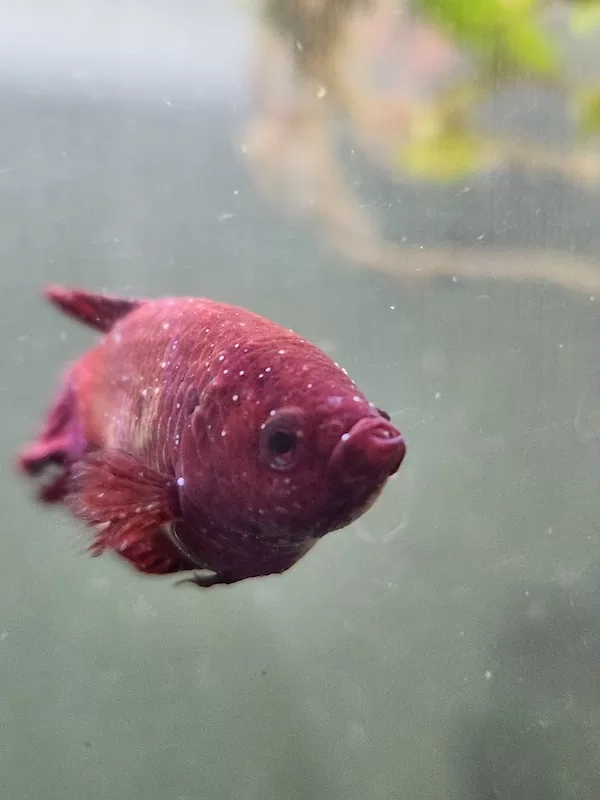Fish Diseases, Illnesses
How to Treat Ich in Aquarium Fish: Symptoms & Treatment
How to Treat Ich (White Spot Disease) in Aquarium Fish
Hey there, fish enthusiasts! If you’re here, you’re probably dealing with Ich, also known as White Spot Disease. I’ve been in your shoes, and I know how stressful it can be. Ich is one of the most common problems in the aquarium world, but the good news is that it’s manageable once you know what to do. You can treat Ich effectively. Whether you’re just starting or have faced Ich more times than you’d like, I’m here to help you tackle it.
What is Ich?
Ich, short for Ichthyophthirius multifiliis, is a parasitic disease that targets freshwater fish. It’s commonly called White Spot Disease because of the tiny white spots that appear on the fish’s body, fins, and gills. It’s caused by a protozoan parasite that burrows into the fish’s skin, leading to discomfort for your fish and a headache for us as aquarists.
When my angelfish came down with Ich, I watched it rubbing against tank decorations in a futile attempt to get some relief. That’s when I knew it was time to take action. Ich spreads quickly, so catching it early is key.
How do I spot and diagnose Ich?
Identifying Ich early can make a huge difference. Here’s what to watch for:
- White Spots: These small grains of sugar-like spots are the most obvious sign.
- Rubbing or Flashing: Fish rubbing against rocks, plants, or the tank glass. It looks like they’re trying to scratch an itch.
- Labored Breathing: Since Ich affects the gills, it makes it harder for fish to breathe.
- Loss of Appetite: If your fish stop eating, it could be because they’re feeling unwell due to Ich.
How does the Ich lifecycle work?
Understanding Ich’s lifecycle is crucial to beating it. There are three stages to keep in mind:
- Trophont Stage: The stage where you see white spots on your fish as the parasite feeds and grows.
- Tomont Stage: The parasite drops off the fish and forms cysts on the substrate. This is when they’re waiting for the right moment to strike.
- Theront Stage: The parasites hatch and swim around looking for a host. This is the only stage where treatments can eliminate them.
How can I treat Ich in my tank?
1. Heat Treatment
One of the simplest methods is raising the tank temperature to 82-86°F (28-30°C). Heat speeds up the parasite’s lifecycle, pushing it to its vulnerable stage faster.
Steps:
- Gradually increase the temperature by 2°F every 12 hours until you reach 86°F.
- Make sure to add extra aeration, as higher temperatures reduce oxygen in the water.
- Maintain the temperature for 7-10 days to fully break the cycle.
2. Salt Treatment
Adding aquarium salt is another effective option. It messes with the parasite’s ability to balance its cells.
Dosage:
Use 1 tablespoon of salt per 5 gallons of water.
Steps:
- Dissolve the salt in a separate container of tank water to avoid burns.
- After each water change, add the correct amount of salt back into the tank.
3. Chemical Medications
If needed, you can use Ich medications like malachite green or formalin.
Recommended Product:
Ich-X on Amazon is an effective medication for treating Ich.
Steps:
- Always read and follow the instructions.
- Remove activated carbon from your filter before adding the meds.
- Monitor your fish closely during treatment to ensure they don’t experience undue stress.
4. Quarantine Tank
A quarantine tank can help contain the spread and make it easier to treat infected fish. For more guidance on how to set up a quarantine tank, check out this detailed guide.
Steps:
- Set up a separate tank with matching water conditions.
- Move infected fish carefully to the quarantine tank.
- Apply the treatment of your choice.
5. Combination Therapy
If Ich is persistent, you can combine heat and medication for a more thorough approach.
Steps:
- Slowly raise the temperature as described earlier.
- Add medication once the temperature is stable.
- Keep an eye on water parameters, as medications can impact the biological filter.
How can I prevent Ich from coming back?
The best way to deal with Ich is to stop it from happening in the first place. Here are some ways to keep it at bay:
- Quarantine New Fish: Always quarantine new fish for at least 2 weeks before adding them to your main tank.
- Maintain Stable Water Conditions: Stress weakens fish and gives Ich an opening, so keep water parameters stable. Using a reliable testing kit like the API Freshwater Master Test Kit will help you monitor these levels.
- Avoid Overcrowding: Stick to a reasonable stocking level to prevent stress and poor water quality.
How do I handle resistant strains of Ich?
Sometimes, Ich can be tough to eliminate. In those cases, here’s what I recommend:
- Alternate Medications: If Ich doesn’t respond to one type of medication, try switching to copper-based treatments.
- Extended Treatment Periods: Treat for 7-10 days instead of the usual 3-5.
- UV Sterilizers: Adding a UV Sterilizer can help reduce free-swimming parasites.
Frequently Asked Questions about Ich
Q: Can Ich affect both freshwater and saltwater fish?
Yes, but the parasites differ. Ichthyophthirius multifiliis affects freshwater fish, while Cryptocaryon irritans targets saltwater fish.
Q: How long does it take to get rid of Ich?
Typically, it takes 7-14 days, depending on treatment and tank temperature.
Q: Can I prevent Ich naturally?
Yes, by quarantining new fish, reducing stress, and maintaining good water conditions.
Q: Should I move infected fish to treat Ich?
It’s not always necessary, but a quarantine tank can help if a fish is struggling.
Q: Is heat treatment alone enough?
It can be, but combining it with medication often gives better results.
Q: Can Ich spread through plants or decorations?
Yes, it can hitch a ride, so disinfect anything before adding it to your tank.
Ich may be a common issue, but with quick action and the right treatments, you can overcome it. Prevention is the best strategy—quarantine new fish, maintain stable water conditions, and minimize stress. Every experience dealing with Ich teaches you more about your tank and makes you a better fishkeeper.


